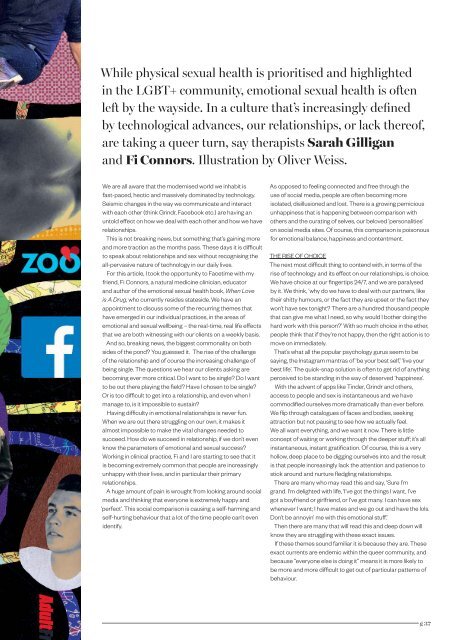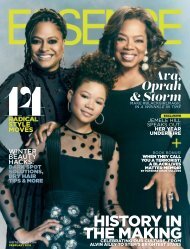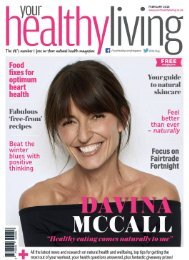Create successful ePaper yourself
Turn your PDF publications into a flip-book with our unique Google optimized e-Paper software.
While physical sexual health is prioritised and highlighted<br />
in the LGBT+ community, emotional sexual health is often<br />
left by the wayside. In a culture that’s increasingly defined<br />
by technological advances, our relationships, or lack thereof,<br />
are taking a queer turn, say therapists Sarah Gilligan<br />
and Fi Connors. Illustration by Oliver Weiss.<br />
We are all aware that the modernised world we inhabit is<br />
fast-paced, hectic and massively dominated by technology.<br />
Seismic changes in the way we communicate and interact<br />
with each other (think Grindr, Facebook etc.) are having an<br />
untold effect on how we deal with each other and how we have<br />
relationships.<br />
This is not breaking news, but something that’s gaining more<br />
and more traction as the months pass. These days it is difficult<br />
to speak about relationships and sex without recognising the<br />
all-pervasive nature of technology in our daily lives.<br />
For this article, I took the opportunity to Facetime with my<br />
friend, Fi Connors, a natural medicine clinician, educator<br />
and author of the emotional sexual health book, When Love<br />
is A Drug, who currently resides stateside. We have an<br />
appointment to discuss some of the recurring themes that<br />
have emerged in our individual practices, in the areas of<br />
emotional and sexual wellbeing – the real-time, real life effects<br />
that we are both witnessing with our clients on a weekly basis.<br />
And so, breaking news, the biggest commonality on both<br />
sides of the pond? You guessed it. The rise of the challenge<br />
of the relationship and of course the increasing challenge of<br />
being single. The questions we hear our clients asking are<br />
becoming ever more critical. Do I want to be single? Do I want<br />
to be out there playing the field? Have I chosen to be single?<br />
Or is too difficult to get into a relationship, and even when I<br />
manage to, is it impossible to sustain?<br />
Having difficulty in emotional relationships is never fun.<br />
When we are out there struggling on our own, it makes it<br />
almost impossible to make the vital changes needed to<br />
succeed. How do we succeed in relationship, if we don’t even<br />
know the parameters of emotional and sexual success?<br />
Working in clinical practice, Fi and I are starting to see that it<br />
is becoming extremely common that people are increasingly<br />
unhappy with their lives, and in particular their primary<br />
relationships.<br />
A huge amount of pain is wrought from looking around social<br />
media and thinking that everyone is extremely happy and<br />
‘perfect’. This social comparison is causing a self-harming and<br />
self-hurting behaviour that a lot of the time people can’t even<br />
identify.<br />
As opposed to feeling connected and free through the<br />
use of social media, people are often becoming more<br />
isolated, disillusioned and lost. There is a growing pernicious<br />
unhappiness that is happening between comparison with<br />
others and the curating of selves, our beloved ‘personalities’<br />
on social media sites. Of course, this comparison is poisonous<br />
for emotional balance, happiness and contentment.<br />
THE RISE OF CHOICE<br />
The next most difficult thing to contend with, in terms of the<br />
rise of technology and its effect on our relationships, is choice.<br />
We have choice at our fingertips 24/7, and we are paralysed<br />
by it. We think, ‘why do we have to deal with our partners, like<br />
their shitty humours, or the fact they are upset or the fact they<br />
won’t have sex tonight? There are a hundred thousand people<br />
that can give me what I need, so why would I bother doing the<br />
hard work with this person?’ With so much choice in the ether,<br />
people think that if they’re not happy, then the right action is to<br />
move on immediately.<br />
That’s what all the popular psychology gurus seem to be<br />
saying, the Instagram mantras of ‘be your best self,’ ‘live your<br />
best life’. The quick-snap solution is often to get rid of anything<br />
perceived to be standing in the way of deserved ‘happiness’.<br />
With the advent of apps like Tinder, Grindr and others,<br />
access to people and sex is instantaneous and we have<br />
commodified ourselves more dramatically than ever before.<br />
We flip through catalogues of faces and bodies, seeking<br />
attraction but not pausing to see how we actually feel.<br />
We all want everything, and we want it now. There is little<br />
concept of waiting or working through the deeper stuff; it’s all<br />
instantaneous, instant gratification. Of course, this is a very<br />
hollow, deep place to be digging ourselves into and the result<br />
is that people increasingly lack the attention and patience to<br />
stick around and nurture fledgling relationships.<br />
There are many who may read this and say, ‘Sure I’m<br />
grand. I’m delighted with life, ‘I’ve got the things I want, I’ve<br />
got a boyfriend or girlfriend, or I‘ve got many. I can have sex<br />
whenever I want; I have mates and we go out and have the lols.<br />
Don’t be annoyin’ me with this emotional stuff.’<br />
Then there are many that will read this and deep down will<br />
know they are struggling with these exact issues.<br />
If these themes sound familiar it is because they are. These<br />
exact currents are endemic within the queer community, and<br />
because “everyone else is doing it” means it is more likely to<br />
be more and more difficult to get out of particular patterns of<br />
behaviour.<br />
g 37















